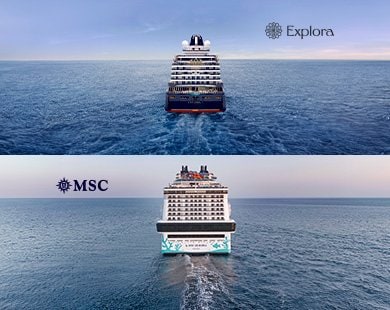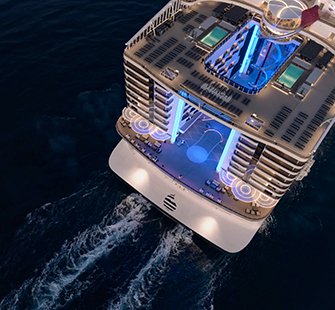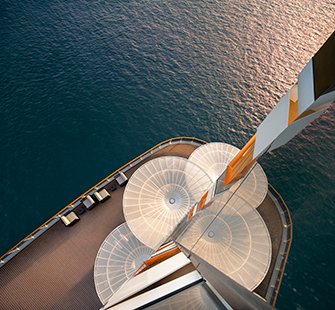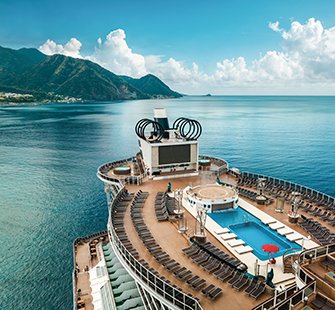sustainability
There's more to cruising
We are committed to taking meaningful, measurable actions that have a long-term positive impact on our guests, our employees and our planet. We continue to work towards achieving net zero greenhouse gas emissions by 2050 by investing in new technology and design, renewable fuels and operational efficiency.
Our efforts are organised in key areas of action - People, Planet, Technology, Efficiency and fuels, Responsible tourism, Supply and value chain.
EFFICIENCY AND FUELS
TOURISM
VALUE CHAIN
Prioritizing wellbeing
The "People" section focuses on the welfare and development of our employees and guests It highlights the importance of safety, well-being, and career growth opportunities for their crew, along with maintaining high health standards on board for all. We foster a positive and supportive environment for everyone involved in the company’s operations.
Discover more
Respect for the environment
The "Planet" section focuses on the company’s commitment to environmental protection and sustainability. Helping to tackle climate change and promoting ocean diversity is critical to our business and we are determined to play our role and contribute to global efforts.
Discover more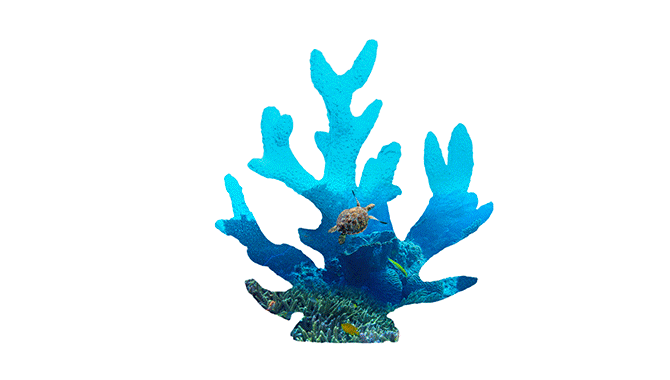
Our road to net zero
The only way to achieve our sustainability goals is via renewable fuels and new technologies. This section outlines our efforts to achieve net-zero greenhouse gas emissions by 2050, to improve air quality, and efficiently manage resources and waste. Innovation is crucial for MSC Cruises to reduce our environmental impact, comply with regulatory demands, improve operational efficiency and costs and meet changing consumer expectations.
Discover more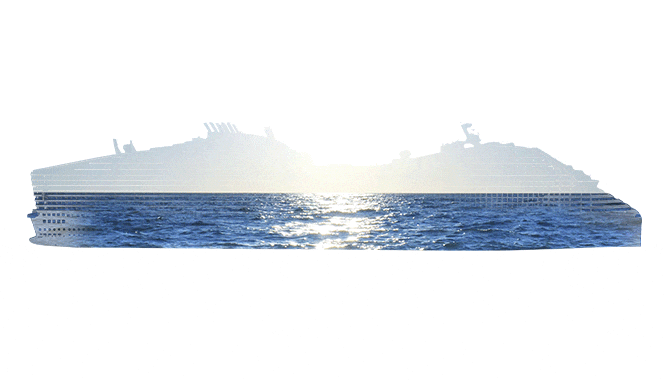
Conscious ways to travel
Cruises provide life-enhancing opportunities for people to explore some of the world's most stunning and fascinating locations. We want to support the communities we visit, through responsible tourism and by contributing to positive social and economic impacts, ensuring future development and growth in the local communities we visit.
Discover more
Responsible practices
We want to ensure that our procurement practices have a positive impact on communities and reduce the impact on the environment. Our Sustainable Procurement Committee involves senior and top managers in procurement, logistics and sustainability who meet to review operations across our supply chain, helping to standardise our approach and identify new focus areas in a constantly changing marketplace.
Discover more

Prioritizing wellbeing
The "People" section focuses on the welfare and development of our employees and guests It highlights the importance of safety, well-being, and career growth opportunities for their crew, along with maintaining high health standards on board for all. We foster a positive and supportive environment for everyone involved in the company’s operations.
Discover more
Respect for the environment
The "Planet" section focuses on the company’s commitment to environmental protection and sustainability. Helping to tackle climate change and promoting ocean diversity is critical to our business and we are determined to play our role and contribute to global efforts.
Discover moreEFFICIENCY AND FUELS

Our road to net zero
The only way to achieve our sustainability goals is via renewable fuels and new technologies. This section outlines our efforts to achieve net-zero greenhouse gas emissions by 2050, to improve air quality, and efficiently manage resources and waste. Innovation is crucial for MSC Cruises to reduce our environmental impact, comply with regulatory demands, improve operational efficiency and costs and meet changing consumer expectations.
Discover moreTOURISM

Conscious ways to travel
Cruises provide life-enhancing opportunities for people to explore some of the world's most stunning and fascinating locations. We want to support the communities we visit, through responsible tourism and by contributing to positive social and economic impacts, ensuring future development and growth in the local communities we visit.
Discover moreVALUE CHAIN

Responsible practices
We want to ensure that our procurement practices have a positive impact on communities and reduce the impact on the environment. Our Sustainable Procurement Committee involves senior and top managers in procurement, logistics and sustainability who meet to review operations across our supply chain, helping to standardise our approach and identify new focus areas in a constantly changing marketplace.
Discover more
SUSTAINABILITY REPORTS
At MSC Cruises, sustainability is a long-term business commitment.
Browse our Sustainability reports to understand more about what we do.

MSC FOUNDATION
TOGETHER WE CAN MAKE A DIFFERENCE
As a family-owned company with a global seafaring heritage that dates back to 1675, we care passionately about the seas and have a real love of the beautiful places and inspiring cultures we take our guests to explore all over the world. This has led us to launch many life-changing initiatives over the years.
The non-profit MSC Foundation was founded in 2018 to lead and coordinate these conservation and humanitarian commitments worldwide, developing the longstanding philanthropic partnerships of all the MSC Group companies and launching many new initiatives.
Now a leading global corporate philanthropic organisation supporting ocean conservation initiatives, our MSC Foundation works to restore the critical balance between people and nature. Utilising our global reach and unique knowledge of the sea, we take immediate action to protect and nurture the blue planet, its peoples and our shared cultural heritage. We likewise help disaster-struck populations toward recovery and support vulnerable communities around the world to realise their full potential through education, sustainable development, and humanitarian medical programmes.


